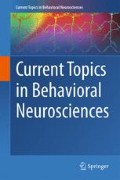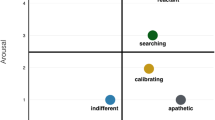Abstract
Ecstatic epilepsy is a rare form of focal epilepsy linked to the anterior insula in which patients experience a blissful state with a unique set of symptoms, including a feeling of physical well-being, mental clarity, a sense of oneness with the universe, and time dilation. In this chapter, we reflect on how these symptoms coincide with our current knowledge of the insula’s functions and explore how this stunning natural model can further inform our understanding of the insula’s role in the sentient self, uncertainty and surprise monitoring, and metacognitive feelings.
Similar content being viewed by others
Notes
- 1.
For an example using speech listening, see Caucheteux et al. (2023).
- 2.
One should allow for the possibility that surprise includes the situation where the world is less uncertain than in one’s “virtual model of the world.” This may prompt the agent to change the world to have more “excitement.”
- 3.
As such, the AIns operates like the adapter in the Model Reference Based Adaptive Control (MRAC) model in engineering (Nguyen 2018), sending modulatory signals when it receives input that is surprising compared to what is expected based on the reference model.
- 4.
In meditation, non-dualistic traditions assert that ultimate reality is a unified whole, and any apparent separations or distinctions are illusion. This view seems to have been shared by Albert Einstein who wrote “A human being experiences himself, his thoughts and feelings as something separated from the rest – a kind of optical delusion of his consciousness” (1950’s letter to Robert Marcus).
References
Aziz-Zadeh L, Kaplan JT, Iacoboni M (2009) “Aha!”: the neural correlates of verbal insight solutions. Hum Brain Mapp 30(3):908–916. https://doi.org/10.1002/hbm.20554
Barrett LF (2014) The conceptual act theory: a Précis. Emot Rev 6(4):292–297. https://doi.org/10.1177/1754073914534479
Barrett LF, Simmons WK (2015) Interoceptive predictions in the brain. Nat Rev Neurosci 16(7):419–429. https://doi.org/10.1038/nrn3950
Barros M, Schultz L (2023) The transformative potential of religious, spiritual, and mystical experiences. 868201 Bytes. https://doi.org/10.6084/M9.FIGSHARE.22225213.V2
Bartolomei F, Lagarde S, Scavarda D, Carron R, Bénar CG, Picard F (2019) The role of the dorsal anterior insula in ecstatic sensation revealed by direct electrical brain stimulation. Brain Stimul 12(5):1121–1126. https://doi.org/10.1016/j.brs.2019.06.005
Bossaerts P (2010) Risk and risk prediction error signals in anterior insula. Brain Struct Funct 214(5):645–653. https://doi.org/10.1007/s00429-010-0253-1
Bossaerts P (2018) Formalizing the function of anterior insula in rapid adaptation. Front Integr Neurosci 12. https://doi.org/10.3389/fnint.2018.00061
Caucheteux C, Gramfort A, King J-R (2023) Evidence of a predictive coding hierarchy in the human brain listening to speech. Nat Hum Behav 7(3):430–441. https://doi.org/10.1038/s41562-022-01516-2
Chang LJ, Yarkoni T, Khaw MW, Sanfey AG (2013) Decoding the role of the insula in human cognition: functional parcellation and large-scale reverse inference. Cereb Cortex 23(3):739–749. https://doi.org/10.1093/cercor/bhs065
Christopoulos GI, Tobler PN, Bossaerts P, Dolan RJ, Schultz W (2009) Neural correlates of value, risk, and risk aversion contributing to decision making under risk. J Neurosci 29(40):12574–12583. https://doi.org/10.1523/JNEUROSCI.2614-09.2009
Clark A (2013) Whatever next? Predictive brains, situated agents, and the future of cognitive science. Behav Brain Sci 36(3):181–204. https://doi.org/10.1017/S0140525X12000477
Colman W (2015) Bounded in a nutshell and a king of infinite space: the embodied self and its intentional world. J Anal Psychol 60(3):316–335. https://doi.org/10.1111/1468-5922.12152
Cosentino S, Brickman AM, Griffith E, Habeck C, Cines S, Farrell M, Shaked D, Huey ED, Briner T, Stern Y (2015) The right insula contributes to memory awareness in cognitively diverse older adults. Neuropsychologia 75:163–169. https://doi.org/10.1016/j.neuropsychologia.2015.05.032
Craig AD (2002) How do you feel? Interoception: the sense of the physiological condition of the body. Nat Rev Neurosci 3(8):655–666. https://doi.org/10.1038/nrn894
Craig AD (2003) Interoception: the sense of the physiological condition of the body. Curr Opin Neurobiol 13(4):500–505. https://doi.org/10.1016/S0959-4388(03)00090-4
Craig AD (2009a) How do you feel – now? The anterior insula and human awareness. Nat Rev Neurosci 10(1):59–70. https://doi.org/10.1038/nrn2555
Craig AD (2009b) Emotional moments across time: a possible neural basis for time perception in the anterior insula. Philos Trans R Soc Lond B Biol Sci 364(1525):1933–1942. https://doi.org/10.1098/rstb.2009.0008
Craig AD, Chen K, Bandy D, Reiman EM (2000) Thermosensory activation of insular cortex. Nat Neurosci 3(2):184–190. https://doi.org/10.1038/72131
Critchley HD, Garfinkel SN (2017) Interoception and emotion. Curr Opin Psychol 17:7–14. https://doi.org/10.1016/j.copsyc.2017.04.020
d’Acremont M, Bossaerts P (2016) Neural mechanisms behind identification of leptokurtic noise and adaptive behavioral response. Cereb Cortex 26(4):1818–1830. https://doi.org/10.1093/cercor/bhw013
Dali G, Brosnan M, Tiego J, Johnson BP, Fornito A, Bellgrove MA, Hester R (2022) Examining the neural correlates of error awareness in a large fMRI study. Cereb Cortex 33(2):458–468. https://doi.org/10.1093/cercor/bhac077
Damasio A (1994) Descartes’ error: emotion, reason and the human. Brain.
Danek AH, Wiley J (2017) What about false insights? Deconstructing the Aha! Experience along its multiple dimensions for correct and incorrect solutions separately. Front Psychol 7. https://www.frontiersin.org. https://doi.org/10.3389/fpsyg.2016.02077
Dostoevsky F (1869) The idiot
Fernández Velasco P, Loev S (2024) Metacognitive feelings: a predictive-processing perspective. Perspect Psychol Sci:17456916231221976. https://doi.org/10.1177/17456916231221976
Fleming SM, Dolan RJ (2012) The neural basis of metacognitive ability. Philosophical Transactions of the Royal Society B: Biological Sciences 367(1594):1338–1349. https://doi.org/10.1098/rstb.2011.0417
Fouragnan E, Retzler C, Philiastides MG (2018) Separate neural representations of prediction error valence and surprise: evidence from an fMRI meta-analysis. Hum Brain Mapp 39(7):2887–2906. https://doi.org/10.1002/hbm.24047
Friston K, FitzGerald T, Rigoli F, Schwartenbeck P, Pezzulo G (2017) Active inference: a process theory. Neural Comput 29(1) Article 1. https://doi.org/10.1162/NECO_a_00912
Geurts LS, Cooke JRH, van Bergen RS, Jehee JFM (2022) Subjective confidence reflects representation of Bayesian probability in cortex. Nat Hum Behav 6(2):294–305. https://doi.org/10.1038/s41562-021-01247-w
Gogolla N (2017) The insular cortex. Curr Biol 27(12):R580–R586. https://doi.org/10.1016/j.cub.2017.05.010
Goupil L, Proust J (2023) Curiosity as a metacognitive feeling. Cognition 231:105325. https://doi.org/10.1016/j.cognition.2022.105325
Gschwind M, Picard F (2016) Ecstatic epileptic seizures: a glimpse into the multiple roles of the insula. Front Behav Neurosci 10. https://doi.org/10.3389/fnbeh.2016.00021
Harrison DW (2015) Parasympathetic and sympathetic tone. In: Harrison IDW (ed) Brain asymmetry and neural systems. Springer, pp 441–453. https://doi.org/10.1007/978-3-319-13069-9_26
Harrison OK, Köchli L, Marino S, Luechinger R, Hennel F, Brand K, Hess AJ, Frässle S, Iglesias S, Vinckier F, Petzschner FH, Harrison SJ, Stephan KE (2021) Interoception of breathing and its relationship with anxiety. Neuron 109(24):4080–4093.e8. https://doi.org/10.1016/j.neuron.2021.09.045
Hasenkamp W, Wilson-Mendenhall CD, Duncan E, Barsalou LW (2012) Mind wandering and attention during focused meditation: a fine-grained temporal analysis of fluctuating cognitive states. Neuroimage 59(1):750–760. https://doi.org/10.1016/j.neuroimage.2011.07.008
Hassanpour MS, Yan L, Wang DJJ, Lapidus RC, Arevian AC, Simmons WK, Feusner JD, Khalsa SS (2016) How the heart speaks to the brain: neural activity during cardiorespiratory interoceptive stimulation. Philos Trans R Soc B Biol Sci 371(1708):20160017. https://doi.org/10.1098/rstb.2016.0017
Hassanpour MS, Simmons WK, Feinstein JS, Luo Q, Lapidus RC, Bodurka J, Paulus MP, Khalsa SS (2018) The insular cortex dynamically maps changes in cardiorespiratory interoception. Neuropsychopharmacology 43(2):426–434. https://doi.org/10.1038/npp.2017.154
James W (1890) The principles of psychology. http://psychclassics.yorku.ca/James/Principles/
James W (1985) The varieties of religious experience. Harvard University Press. https://www.hup.harvard.edu/books/9780674932258
Josipovic Z (2019) Chapter 12 – nondual awareness: consciousness-as-such as non-representational reflexivity. In: Srinivasan N (ed) Progress in brain research, vol 244. Elsevier, pp 273–298. https://doi.org/10.1016/bs.pbr.2018.10.021
Knutson B, Huettel SA (2015) The risk matrix. Curr Opin Behav Sci 5:141–146. https://doi.org/10.1016/j.cobeha.2015.10.012
Kuhnen CM, Knutson B (2005) The neural basis of financial risk taking. Neuron 47(5):763–770. https://doi.org/10.1016/j.neuron.2005.08.008
Kurth F, Zilles K, Fox PT, Laird AR, Eickhoff SB (2010) A link between the systems: functional differentiation and integration within the human insula revealed by meta-analysis. Brain Struct Funct 214(5):519–534. https://doi.org/10.1007/s00429-010-0255-z
Lacuey N, Zonjy B, Kahriman ES, Marashly A, Miller J, Lhatoo SD, Lüders HO (2016) Homotopic reciprocal functional connectivity between anterior human insulae. Brain Struct Funct 221(5):2695–2701. https://doi.org/10.1007/s00429-015-1065-0
Landtblom AM, Lindehammar H, Karlsson H, Craig AD (2011) Insular cortex activation in a patient with “sensed presence”/ecstatic seizures. Epilepsy Behav 20(4):714–718
Laukkonen RE, Slagter HA (2021) From many to (n)one: meditation and the plasticity of the predictive mind. Neurosci Biobehav Rev 128:199–217. https://doi.org/10.1016/j.neubiorev.2021.06.021
Laukkonen RE, Webb M, Salvi C, Tangen JM, Slagter HA, Schooler JW (2023) Insight and the selection of ideas. Neurosci Biobehav Rev 153:105363. https://doi.org/10.1016/j.neubiorev.2023.105363
Liakoni V, Lehmann MP, Modirshanechi A, Brea J, Lutti A, Gerstner W, Preuschoff K (2022) Brain signals of a surprise-actor-critic model: evidence for multiple learning modules in human decision making. Neuroimage 246:118780. https://doi.org/10.1016/j.neuroimage.2021.118780
Livneh Y, Sugden AU, Madara JC, Essner RA, Flores VI, Sugden LA, Resch JM, Lowell BB, Andermann ML (2020) Estimation of current and future physiological states in insular cortex. Neuron 105(6):1094–1111.e10. https://doi.org/10.1016/j.neuron.2019.12.027
Loued-Khenissi L, Pfeuffer A, Einhäuser W, Preuschoff K (2020) Anterior insula reflects surprise in value-based decision-making and perception. Neuroimage 210:116549. https://doi.org/10.1016/j.neuroimage.2020.116549
Luo L, Rodriguez E, Jerbi K, Lachaux J-P, Martinerie J, Corbetta M, Shulman GL, Piomelli D, Turrigiano GG, Nelson SB, Joëls M, De Kloet ER, Holsboer F, Amodio DM, Frith CD, Block ML, Zecca L, Hong J-S, Dantzer R et al (2010) Ten years of nature reviews neuroscience: insights from the highly cited. Nat Rev Neurosci 11(10):718–726. https://doi.org/10.1038/nrn2912
Martial C, Cassol H, Laureys S, Gosseries O (2020) Near-death experience as a probe to explore (disconnected) consciousness. Trends Cogn Sci 24(3):173–183. https://doi.org/10.1016/j.tics.2019.12.010
McGovern HT, Grimmer HJ, Doss MK, Hutchinson BT, Timmermann C, Lyon A, Corlett PR, Laukkonen RE (2024) An integrated theory of false insights and beliefs under psychedelics. Commun Psychol 2(69). https://doi.org/10.1038/s44271-024-00120-6
Mella N, Bourgeois A, Perren F, Viaccoz A, Kliegel M, Picard F (2019) Does the insula contribute to emotion-related distortion of time? A neuropsychological approach. Hum Brain Mapp 40(5):1470–1479. https://doi.org/10.1002/hbm.24460
Menon V, Uddin LQ (2010) Saliency, switching, attention and control: a network model of insula function. Brain Struct Funct 214(5):655–667. https://doi.org/10.1007/s00429-010-0262-0
Nagel R, Brovelli A, Heinemann F, Coricelli G (2018) Neural mechanisms mediating degrees of strategic uncertainty. Soc Cogn Affect Neurosci 13(1):52–62. https://doi.org/10.1093/scan/nsx131
Nencha U, Spinelli L, Vulliemoz S, Seeck M, Picard F (2022) Insular stimulation produces mental clarity and bliss. Ann Neurol 91(2):289–292. https://doi.org/10.1002/ana.26282
Nguyen NT (2018) Model-reference adaptive control. In: Nguyen NT (ed) Model-reference adaptive control: a primer. Springer, pp 83–123. https://doi.org/10.1007/978-3-319-56393-0_5
Parr T, Friston KJ (2019) Attention or salience? Curr Opin Psychol 29:1–5. https://doi.org/10.1016/j.copsyc.2018.10.006
Picard F (2013) State of belief, subjective certainty and bliss as a product of cortical dysfunction. Cortex 49(9):2494–2500. https://doi.org/10.1016/j.cortex.2013.01.006
Picard F (2023) Ecstatic or mystical experience through epilepsy. J Cogn Neurosci 35(9):1372–1381. https://doi.org/10.1162/jocn_a_02031
Picard F, Craig AD (2009) Ecstatic epileptic seizures: a potential window on the neural basis for human self-awareness. Epilepsy Behav 16(3):539–546. https://doi.org/10.1016/j.yebeh.2009.09.013
Picard F, Friston K (2014) Predictions, perception, and a sense of self. Neurology 83(12):1112–1118. https://doi.org/10.1212/WNL.0000000000000798
Picard F, Kurth F (2014) Ictal alterations of consciousness during ecstatic seizures. Epilepsy Behav 30:58–61. https://doi.org/10.1016/j.yebeh.2013.09.036
Picard F, Bossaerts P, Bartolomei F (2021) Epilepsy and ecstatic experiences: the role of the insula. Brain Sci 11(11):1384. https://doi.org/10.3390/brainsci11111384
Picard F, Scavarda D, Bartolomei F (2013) Induction of a sense of bliss by electrical stimulation of the anterior insula. Cortex 49(10):2935–2937. https://doi.org/10.1016/j.cortex.2013.08.013
Preuschoff K, Quartz SR, Bossaerts P (2008) Human insula activation reflects risk prediction errors as well as risk. J Neurosci 28(11):2745–2752. https://doi.org/10.1523/JNEUROSCI.4286-07.2008
Prilutski Y, Livneh Y (2023) Physiological needs: sensations and predictions in the insular cortex. Physiology 38(2):73–81. https://doi.org/10.1152/physiol.00019.2022
Proust J (2019) From comparative studies to interdisciplinary research on metacognition. Anim Behav Cogn 6(4):309–328. https://doi.org/10.26451/abc.06.04.10.2019
Rao RPN, Ballard DH (1999) Predictive coding in the visual cortex: a functional interpretation of some extra-classical receptive-field effects. Nat Neurosci 2(1):79–87. https://doi.org/10.1038/4580
Rudorf S, Preuschoff K, Weber B (2012) Neural correlates of anticipation risk reflect risk preferences. J Neurosci 32(47):16683–16692. https://doi.org/10.1523/JNEUROSCI.4235-11.2012
Salomon R, Ronchi R, Dönz J, Bello-Ruiz J, Herbelin B, Martet R, Faivre N, Schaller K, Blanke O (2016) The insula mediates access to awareness of visual stimuli presented synchronously to the heartbeat. J Neurosci 36(18):5115–5127. https://doi.org/10.1523/JNEUROSCI.4262-15.2016
Schwartz BL, Metcalfe J (2011) Tip-of-the-tongue (TOT) states: retrieval, behavior, and experience. Mem Cognit 39(5):737–749. https://doi.org/10.3758/s13421-010-0066-8
Seeley WW, Menon V, Schatzberg AF, Keller J, Glover GH, Kenna H, Reiss AL, Greicius MD (2007) Dissociable intrinsic connectivity networks for salience processing and executive control. J Neurosci 27(9):2349–2356. https://doi.org/10.1523/JNEUROSCI.5587-06.2007
Seth AK, Friston KJ (2016) Active interoceptive inference and the emotional brain. Philosophical Transactions of the Royal Society B: Biological Sciences 371(1708):20160007. https://doi.org/10.1098/rstb.2016.0007
Sheldon KM, Lee W, Reeve J (2024) How people find better lifegoals: the goal breakthrough model and its neuroscientific underpinnings. Soc Personal Psychol Compass 18(6):e12974. https://doi.org/10.1111/spc3.12974
Simmons WK, Avery JA, Barcalow JC, Bodurka J, Drevets WC, Bellgowan P (2013) Keeping the body in mind: insula functional organization and functional connectivity integrate interoceptive, exteroceptive, and emotional awareness. Hum Brain Mapp 34(11):2944–2958. https://doi.org/10.1002/hbm.22113
Singer T, Critchley HD, Preuschoff K (2009) A common role of insula in feelings, empathy and uncertainty. Trends Cogn Sci 13(8):334–340. https://doi.org/10.1016/j.tics.2009.05.001
Stuyck H, Aben B, Cleeremans A, Van den Bussche E (2021) The Aha! Moment: is insight a different form of problem solving? Conscious Cogn 90:103055. https://doi.org/10.1016/j.concog.2020.103055
Tang Y-Y, Rothbart MK, Posner MI (2012) Neural correlates of establishing, maintaining, and switching brain states. Trends Cogn Sci 16(6):330–337. https://doi.org/10.1016/j.tics.2012.05.001
Thompson E, Varela FJ (2001) Radical embodiment: neural dynamics and consciousness. Trends Cogn Sci 5(10):418–425. https://doi.org/10.1016/s1364-6613(00)01750-2
Timmermann C, Bauer PR, Gosseries O, Vanhaudenhuyse A, Vollenweider F, Laureys S, Singer T, Antonova E, Lutz A (2023) A neurophenomenological approach to non-ordinary states of consciousness: hypnosis, meditation, and psychedelics. Trends Cogn Sci 27(2):139–159. https://doi.org/10.1016/j.tics.2022.11.006
Tse PU, Intriligator J, Rivest J, Cavanagh P (2004) Attention and the subjective expansion of time. Percept Psychophys 66(7):1171–1189. https://doi.org/10.3758/BF03196844
Tyrand R, Iannotti GR, Bartolomei F, Bratu F, Maliia MD, Nica A, Vulliemoz S, Spinelli L, Schaller KL, Picard F (2024) Brain-heart interaction during ecstatic seizures. Brain Spine. Abstract in press.
Vaccaro AG, Fleming SM (2018) Thinking about thinking: a coordinate-based meta-analysis of neuroimaging studies of metacognitive judgements. Brain Neurosci Adv 2:2398212818810591. https://doi.org/10.1177/2398212818810591
Varela FJ (1996) Neurophenomenology: a methodological remedy for the hard problem. J Conscious Stud 3(4):330–349
Walpola IC, Nest T, Roseman L, Erritzoe D, Feilding A, Nutt DJ, Carhart-Harris RL (2017) Altered insula connectivity under MDMA. Neuropsychopharmacology 42(11):2152–2162. https://doi.org/10.1038/npp.2017.35
Wang X, Wu Q, Egan L, Gu X, Liu P, Gu H, Yang Y, Luo J, Wu Y, Gao Z, Fan J (2019) Anterior insular cortex plays a critical role in interoceptive attention. Elife 8:e42265. https://doi.org/10.7554/eLife.42265
Xavier CH, Mendonça MM, Marins FR, Da Silva ES, Ianzer D, Colugnati DB, Pedrino GR, Fontes MAP (2018) Stating asymmetry in neural pathways: methodological trends in autonomic neuroscience. Int J Neurosci 128(11):1078–1085. https://doi.org/10.1080/00207454.2018.1473396
Zaki J, Davis JI, Ochsner KN (2012) Overlapping activity in anterior insula during interoception and emotional experience. Neuroimage 62(1):493–499. https://doi.org/10.1016/j.neuroimage.2012.05.012
Zhang Y, Zhou W, Wang S, Zhou Q, Wang H, Zhang B, Huang J, Hong B, Wang X (2019) The roles of subdivisions of human insula in emotion perception and auditory processing. Cereb Cortex 29(2):517–528. https://doi.org/10.1093/cercor/bhx334
Author information
Authors and Affiliations
Corresponding author
Ethics declarations
We thank Prof. Peter Bossaerts (University of Cambridge) for very fruitful discussions, and Dr. Nathalie Mella (University of Geneva) for helpful comments.
Funding Sources
This research did not receive any specific grant from funding agencies in the public, commercial, or not-for-profit sectors.
Competing Interests Statement
The authors declare that they have no known competing financial interests or personal relationships that could have appeared to influence the work reported in this manuscript. By declaring no competing interests, the authors affirm that their research findings and interpretations are presented without any undue influence from personal or financial relationships.
Author Contributions
FP: Conceptualization; Writing – original draft, review, and editing; Supervision. NS Writing – original draft, review, and editing. FS: Conceptualization; Writing – original draft, review, and editing.
Rights and permissions
Copyright information
© 2024 The Author(s), under exclusive license to Springer Nature Switzerland AG
About this chapter
Cite this chapter
Sooter, N.M., Seragnoli, F., Picard, F. (2024). Insights from Ecstatic Epilepsy: From Uncertainty to Metacognitive Feelings. In: Current Topics in Behavioral Neurosciences. Springer, Berlin, Heidelberg. https://doi.org/10.1007/7854_2024_528
Download citation
DOI: https://doi.org/10.1007/7854_2024_528
Published:
Publisher Name: Springer, Berlin, Heidelberg




